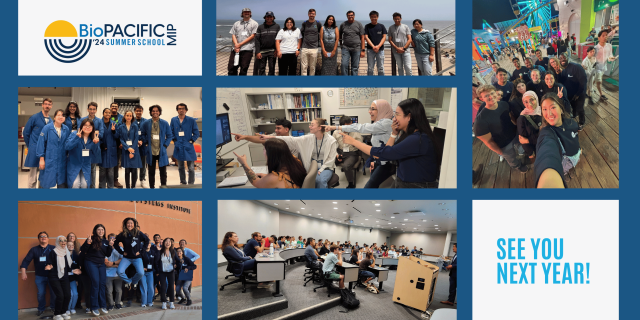BioPACIFIC MIP Summer School 2024
Advancing Sustainable Materials Innovation and Collaboration
The BioPACIFIC MIP Summer School 2024, hosted from July 15-19 at UCSB and UCLA, successfully brought together researchers and students passionate about advancing the field of sustainable polymers. This week-long event provided attendees with valuable hands-on experience and opportunities to engage with leaders in sustainable and biomaterial innovation.
Participants engaged in a series of workshops led by our project scientists, designed to highlight the latest advancements in sustainable polymer synthesis and characterization. Dr. Michael Lake and Dr. Ike Okorafor conducted the workshop on "Utilizing Automation and Synthetic Biology to Generate New Biomaterials," offering insights into cutting-edge techniques. In "MicroED: Welcome to the Future of Biomaterials," Dr. Matthew Mecklenburg and Dr. Jungyoun (James) Cho introduced participants to the transformative potential of MicroED technology. Dr. Juan Manuel Urueña led the "3D Printing for Next-Generation Biomaterials" session, showcasing innovative 3D printing applications. Dr. Morgan Bates and Dr. Zach Nett provided guidance on automation in "Automate the Bench: Getting Started with High-throughput Synthesis," while Dr. Youli Li and Dr. Phillip Kohl shared their expertise in "Advanced X-Ray Diffraction and Scattering for High-throughput Characterization."
The event also featured notable talks from distinguished speakers. Dr. Brett Helms from Berkeley Labs delivered a compelling presentation on "Plastics Redesign for Biorenewable Circularity," while Prof. Javier Read de Alaniz discussed how automation can transform molecules into responsive materials. Additionally, Dr. Eleni Papananou and Dr. Mia Nowotarski conducted three professional development talks on "Visual Science: Crafting Effective Graphical Abstracts," "The Science of Writing," and "How to Write Effective Proposals," offering valuable skills to participants.
Feedback from attendees was overwhelmingly positive, highlighting the program's impact and the expertise of the instructors. One participant remarked, “This week has given me exposure to the capabilities within BioPACIFIC MIP, and I look forward to drafting a proposal to come back in the future for experimentation!” Another attendee shared, “I gained extremely valuable knowledge about the use of automation in synthetic biology. The instructors were extremely helpful in teaching us how to use the instruments.” Participants appreciated the opportunity to network, with one noting, “This summer school is an amazing opportunity to meet with new people, discover new methods of compound discovery, and engage with all of the amazing people involved with the MIP!”
The summer school was attended by 40 students (both graduate and undergraduate) and 4 faculty members from 36 different institutions nationwide, ensuring a rich and diverse learning environment. Efforts to ensure inclusivity were successful, with 46% of the cohort identifying as women and 20% as underrepresented minorities. Additionally, 40% of participants came from non-R1 institutions, and 33% represented Minority Serving Institutions. This diversity underscores the summer school's commitment to inclusivity and accessibility in the field of biomaterials.
The success of the BioPACIFIC MIP Summer School 2024 is a testament to the dedication and enthusiasm of both the participants and organizers. By offering a platform for learning, collaboration, and innovation, the event continues to contribute to the advancement of sustainable materials research and its application in various industries. As the field of sustainable materials continues to evolve, programs like this play a crucial role in shaping the future of sustainable and scalable solutions.
Looking ahead, we are excited to announce plans for another summer school in the summer of 2025. Stay tuned for more information as we continue to expand and enhance this unique educational opportunity.
We extend our heartfelt thanks to the National Science Foundation (NSF) for their support and to all the members of the BioPACIFIC MIP on both the UCSB and UCLA campuses for making this event possible.
